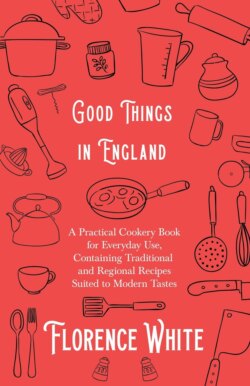Читать книгу Good Things in England - A Practical Cookery Book for Everyday Use, Containing Traditional and Regional Recipes Suited to Modern Tastes - Florence White - Страница 148
На сайте Литреса книга снята с продажи.
II HOME-MADE BREAD, CURRANT AND SPICE BREAD, TEA-CAKES, HOT AND COLD SCONES, WHIGS, HUFFKINS, MUFFINS, PIKELETS.
ОглавлениеMANY of the old recipes require ale yeast, but this has been translated into its equivalent in compressed yeast, or what used to be called German yeast, and those who live in ‘out of the way’ places of the Empire may be glad to know that ‘Royal Yeast Cakes’ (a Canadian product) can be sent anywhere, properly packed for tropical and semi-tropical climates, by the Army and Navy Stores, 105 Victoria Street, London, S.W.i. General equivalents of both compressed yeast and yeast cakes will be found on page 63. It must always be remembered when using yeast that the flour and milk and everything employed must be lukewarm but not on any account too warm; both cold and heat kill yeast.
Anyone who wants first-hand up-to-date practical and scientific information on yeast foods and on chemical aerating agents such as soda, pearlash, baking powders, etc., cannot do better than consult Mr. Kirkland’s Modern Baker, Confectioner and Caterer (1924). Mr. John Kirkland was for years Lecturer and Teacher of Bread-making, National Bakery School, London, and what he does not know on this subject is not worth knowing.
Baking powders are comparatively modern means of aeration. Mr. Kirkland says: ‘It is safe to say about 80 years ago no chemicals except pearlash and ammonia were used by the baker as aerating agent.’
Pure cream of tartar and bicarbonate of soda combine better and are more convenient for this purpose than any other chemical, for the simple reason that ‘when treated with water cream of tartar does not quickly enter into action with the soda; but when the goods are brought into the oven, the increased temperature facilitates the solution of the acid salt, and causes a rapid evolution of gas just at the time it is most necessary. Tartaric acid acts very quickly, and the bread, scones, etc., made with it must be put in the oven at once.’ For this reason I generally use cream of tartar bought at a chemist’s and bicarbonate of soda instead of baking powder.
For the same reason self-raising flour in which cream of tartar is an ingredient, is preferable to one in which tartaric acid or any cheaper agent is used. I know the formula employed by the Civil Service Supply Association is quite sound and their self-raising flour can be recommended because it is made with cream of tartar, not tartaric acid. Self-raising flour is simply plain flour to which chemical raising-agents are added. A word of warning is necessary here: unless otherwise stated, plain household flour is meant in all the recipes given, and to this any raising agent can be added; whereas none should be added to self-raising flour unless definitely stated in the recipe.
A complaint is frequently made that so many eggs are required in good English cookery and that these are expensive; but this is quite a wrong idea, the result of ignorance or wilful misrepresentation. There are of course recipes in which much cream, or butter and eggs are used, and some of these are useful for special occasions; but as a rule when we read of cakes requiring a number of eggs and so forth, if we examine the recipe we shall find that the amount of flour is correspondingly great. Families were larger one hundred years ago, and household staffs were more in number; therefore much greater batches of bread, scones, etc., had to be provided, and baking day was a serious business.
There is no reason, however, why we should not make some bread and scones at home for a treat, even if we live in a small town flat, or in the country where we can have only an oil stove with an oven; or merely a girdle over a wood fire made on a hearth or out of doors. Many of the recipes given are suitable for all these methods of baking.
In many houses and hotels in England all the bread and cakes, tea-breads, etc., are made at home; but as in most other cases it is still necessary to ask for what we want. The demand will create the supply.
